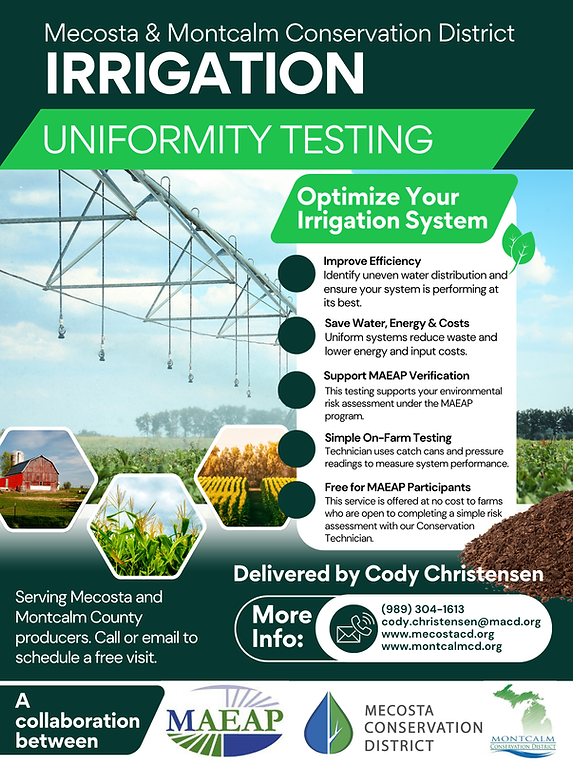What is MAEAP?
The Michigan Agriculture Environmental Assurance Program (MAEAP) is a voluntary, pro-active program designed to help farms of all sizes and commodities prevent and minimize environmental and legal risks through engaging in cost-effective, pollution preventing practices.
.png)
You Can Earn:
-
Recognition as a top steward in the community
-
Regulatory Assurances
-
Increased access to cost share and technical assistance
-
An enduring sense of accomplishment and pride
We Promise To:
-
Keep everything 100% confidential, guaranteed by state law
-
Treat you and your farm with respect
-
Help you with the paperwork and process
-
Help you leave a legacy for your children

Become MAEAP Certified in Four Steps
-
Learn More
-
Attend a workshop or schedule a private meeting to learn if MAEAP is right for you.
-
-
Farm Visit
-
Invite us to tour your farm. A MAEAP technician will recommend practical steps you can take to reduce erosion and runoff into public waters.
-
-
Implement
-
Do the work at you own pace. We can help you work towards your goals and guide you to cost share funds.
-
-
Recognition
-
When the work is done, we will give you a sign to place on your farm and send you a certificate signed by the director of the Michigan Department of Agriculture and Rural Development.
-
Four Categories of Recognition
Farms of any size or commodity can be verified in the Farmstead System demonstrating their investment to environmental stewardship. The Farmstead System addresses environmental risks on the entire farmstead with a focus on protecting surface and groundwater.
The Livestock category focuses on animal production activities. These include manure management practices, as well as practices that protect water and prevent erosion. This category applies to all Michigan livestock farms, regardless of the animals raised or their size.
The Cropping category focuses on field-based activities such as water use, soil conservation, and nutrient management. This category applies to all crops grown in Michigan. These include field crops, vegetables, fruit orchards, greenhouse crops, and ornamental trees.
The Forest, Wetlands & Habitat category focuses on practices that promote sustainable forestry, wetlands, and non-forest habitat. These include forest health; protecting air, water, and soil; and restoring habitat.
What is the Regenerative Agriculture Program?
The Regenerative Agriculture Program provides sustainable farming education with the goal of enhancing soil health.
Core Principles
Understand Your Farm Operation
Maintain Living Roots
Maximize Biodiversity
Integrate Livestock
Keep Soil Covered
Minimize Soil Disturbance
For more information, contact our CTAP Technician, Cody Christensen, at
989-304-1613 or cody.christensen@macd.org
